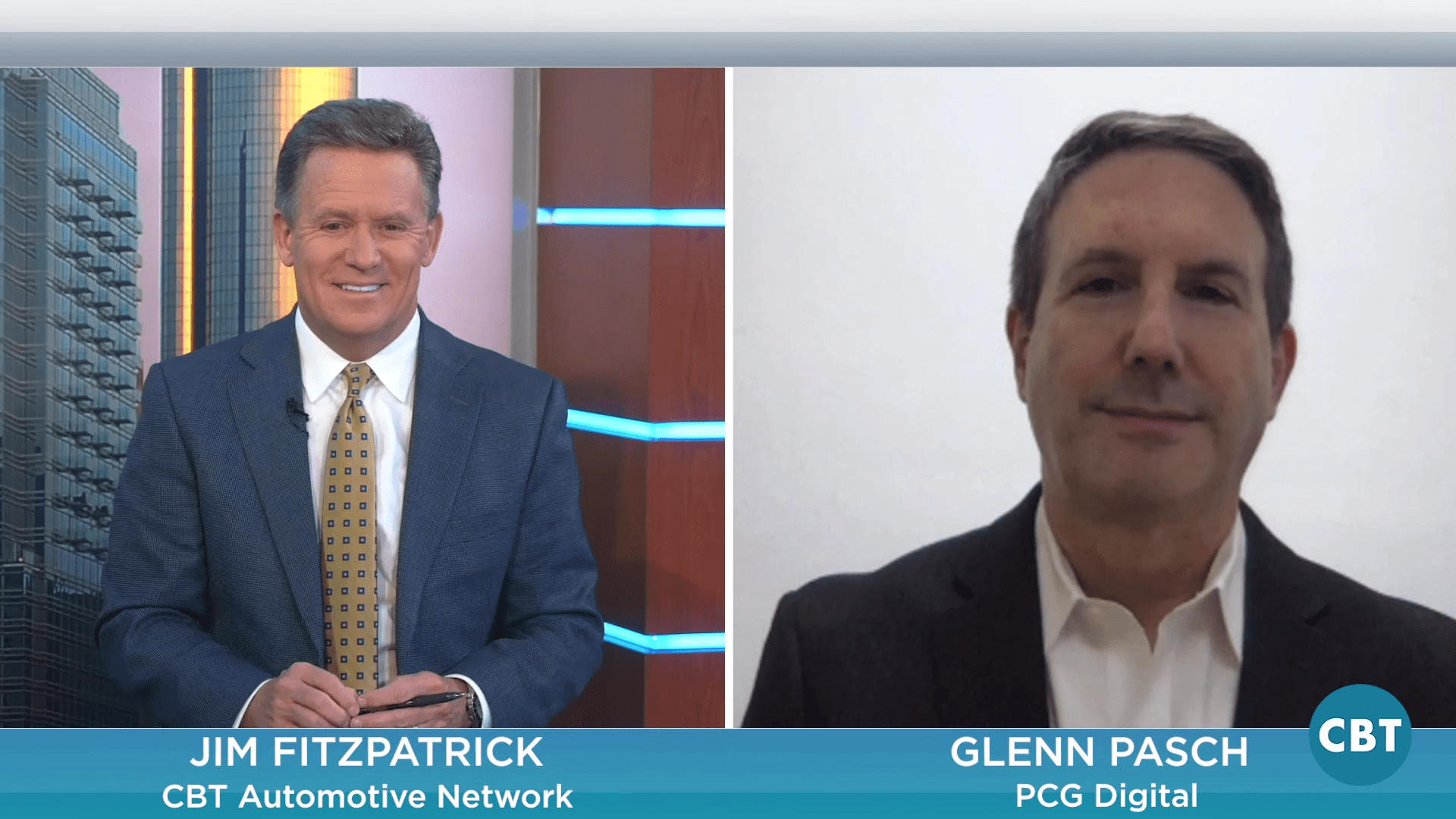On today’s show, we continue our conversation with Glenn Pasch, CEO of PCG Digital where they have recently done over 50 audits with dealers to get a true and accurate sense of how they utilize their marketing and lead handling strategies. We explored the findings with Glenn and got his insight into what successful dealers are doing right, and how to see bigger returns from your marketing budget.
To see part 1 of our interview with Glenn, click here.
Jim Fitzpatrick: Talk to us about these 50 plus audits that you did in the area of marketing for dealers.
Glenn Pasch: Sure, so what we decided to do because a lot of dealers were coming to us who couldn’t use our digital services because they were using other vendors. And a lot of times they were just either, I wouldn’t say confused, but they just wanted another person to validate what was either working in their marketing, what they needed to adjust, and giving them the talking points to go back to their vendor partner to be able to say, “Well, how can adjust this?” And a lot of it came out of just helping them understand their data.
So over the last six, eight months dealers have hired us to do these audits and we take about two, three weeks to get through. We look at all of their analytics, we look at their paid search, social media advertising, as well as looking into their CRM to see how they’re handling their internet opportunities. Also, from a marketing standpoint. Are they really helping to market out why they should do business with the dealership, or are they just focused so hard on that one car?
So we’ve done that and it’s just been fascinating to see the gambit of either successes, in a lot of cases, a lot of waste that dealers are being confronted with.
Jim Fitzpatrick: Yeah, for sure. Can you give us some examples of what you found?
Glenn Pasch: Sure. I’m sure those of you who follow my brother Brian who’s on Auto Marketing now on CBT, he’s been talking a lot on Google Analytics. Literally 8 out of every 10 dealers, most of their analytics are not set up correctly to measure a lot of their marketing.
So they have just basic things. They might have lead forms done, but maybe not phone calls, not click to call, some of them don’t have chats or texts, or they don’t have multi-channels funnels set up to be able to see the influence of their marketing.
The other thing is in terms of paid search. Just a lot of the way the campaigns are set up, are just not helping dealers maximize their spend. They’ll have a campaign that might have three or four keywords in there, but one keyword that’s very broad is chewing up three quarters of the budget, so it’s not funding the others.
So, simple things like that, as well as just inconsistencies in their lead handling process, and yet then they’ll say, “Well, we’re not selling vehicles.” But most of the time I’m finding 20 to 30 vehicles that they could be selling on the opportunities they have if they just maximized a consistent process.
Jim Fitzpatrick: Sure. Talking about those processes, what are the successful dealers doing right in regards to these findings?
Glenn Pasch: One, their analytics are set up. Number two, what I find from them, is that they really have, they feel that they can have a conversation with their vendor partner. I think that’s probably the biggest thing that they’re doing right. They’re either admitting that I don’t know, so they’re just raising their hand and saying, “Okay, I don’t understand this. Can you explain it to me?” Or getting education to them feel more prepared.
In the other piece in terms of handling any of these opportunities, is an accountability process, someone owns it. Someone owns to either understand it and to make it better wherever that process lay. It could be, as I said, the marketing all the way through how you’re handling internet or showroom. Someone has to own it and really be held responsible to continually improve the team.
Jim Fitzpatrick: Right. Somebody has got to champion that whole process.
Glenn Pasch: Exactly.
Jim Fitzpatrick: And what do you see as the most common mistake out there?
Glenn Pasch: Not paying attention. Meaning that you get the reports from your vendor, and you just nod your head and go, “Okay, I guess that’s okay.” Without really understanding and asking the question, where is my marketing budget going? Right?
That I think is the biggest mistake that people are doing, are just assuming that it’s working and from lead handling, they just continue to say, “Hey, we have to sell more.” But just pushing harder and making people work at a poor process isn’t going to get you better. And spending more may get you to sell more, but you’re sort of selling in spite of yourself. And there’s just that waste.
So I think sticking your head in the sand is probably the biggest mistake people are making out there. Spending a boatload of money.
Jim Fitzpatrick: Yeah. And for the most part, dealers out there today want to spend the majority of their time, if not all their time, on running their businesses successfully, whether it be in sales or service. And they’re hoping, in large part, that their vendor is taking care of all this. They’re trusting their vendor to know all of this and to make the necessary corrections. Do you find that to be the case?
Glenn Pasch: Yes, but, and I totally agree with you, and majority of dealers would love nothing better than to just say, “I have this person taking care of this.” But I counter with that, no dealer worth their salt is sending me to the auction, or you to the auction, with a blank checkbook and you roll back and go, “I bought five cars.” And no one is looking what you bought.
They’re hoping at the end of the month that their service department made money. Hoping their F&I department made money. They may not have to run the F&I department, but you and I are going to have a conversation. As long as they’re doing that, with their marketing vendor, they don’t have to note what they do, but they have to have that conversation of saying, “I gave you X amount of dollars, what did I get for it?” In language they understand.
If they do that, I think then they can get back to that trust in the vendor, that they have my back and I can go do what I need to do to run my business. But if you just ignore it … it’s funny, Brian always say, we talk about this all the time, there’s no other department in your business in a dealership that you treat that way. You know everything.
So, that’s what I was saying before, a lot of it takes that education of getting myself educated enough to feel comfortable sitting having a conversation with you.
Jim Fitzpatrick: And with a 2.8% drop last month in new vehicle sales, dealers are looking at some of things, aren’t they? They’re asking these questions. Where before, last year or the year before, or the year before that, it’s been, I don’t want to say a heyday, but it’s been really good times in new vehicles sales, hovering always around 17 million new vehicles.
But when all of a sudden, the business starts to come down a little bit, everybody wants to know, “Hey, what’s going on? What’s going on in this area? Are we getting the biggest bang for our buck in our digital marketing campaign?” Right?
Glenn Pasch: Right. But I think to that, it’s very easy to cut marketing, right?
Jim Fitzpatrick: Yeah. That’s for sure.
Glenn Pasch: I had this conversation with a dealer the other day and he said, “Well, I’m going to cut marketing.” And at least he was honest, he said, “Well, you know, at least if I’m pushing on my salespeople, they’re in front of me all day. I can just trim marketing.”
The problem is you should do an analysis, or an audit, where you say to someone, like our company would say, “If my goal is to cut some of this money back, where should I cut?” Just cutting randomly, I’ll cut everything 10%, is silly. You could be cutting 10% of something that’s working.
On the flip side, with that same focus and intensity of we’re going to cut … am I getting what I need from marketing? You should be looking really hard into am I maximizing the opportunities that we’re getting because that to your point, if people are spending less … they’re pushing their search out a little longer for a car, the car purchase, I’m going to hold onto a little more, you really have to work those opportunities you have. It can’t be, “There’s going to be more tomorrow.” Because there may not be as many tomorrow. So you got to look at both sides.
Jim Fitzpatrick: That’s right. If it was Glenn Pasch Auto Group, how much of your ad budget would be spent in digital and social marketing, versus maybe traditional marketing?
Glenn Pasch: I’d still be 60%, 70%. Again, depending on the market, I’d have to see what’s working, but I’d be way more targeted because now with OTT and a lot of cable, and even radio strategically, direct mail strategically, all of it works. But it is in anymore, “I’m just going to give somebody a lot of money and guess.”
I think everything has to have a point. I think you have to look at everything in your market. I’d still … if you think about it, the majority of people are on the internet. Where’s this going to be shown? The internet. So, that’s where people are. You just have to decide, maybe I cut back a little bit on Google Spend because right now it’s more expensive because the manufacturers have everybody into the paid search game, so now my cost for clicks are up, but maybe Facebook is more economical, and I can be more targeted.
So, you still can take that same amount of money and even shrink it a little bit, you just have to be really smart. I, personally, would be doing a lot more social media. I would be doing maybe a cutback a little bit on paid, and make it more targeted. I would definitely be doubling down on video pre-roll. Those types of things, that’s what I want to see. And video, video, video, that’s what I’d be doing a lot of.
Jim Fitzpatrick: Right. It was funny, you answered that question with 60 or 70% in digital, so you’re still holding out that about 30% of a budget might go into traditional.
Glenn Pasch: Well, I think that it, again, this concept of a 100% digital, there’s still people that read the newspaper, there are still people that will respond to a targeted direct mail piece. Again, it’s strategic where I’m not just sending it to everybody in the area as a waste, but if I really work with a partner that can help me target, same thing with radio, if you’re in an area where people are commuting back and forth all the time, and you say, well, I want to pay for the DJ to read it, or whoever the announcer is, to read my spot, that to me, is worthwhile, versus just randomly playing things at odd times. So it still has value. Maybe the market is 90% digital, but it sure as heck ain’t 30% digital.
Jim Fitzpatrick: Wow. I’ve noticed more ads on TV for car dealers. Some are saying the pendulum might be swinging back. Do you see that to be the case, where dealers are now utilizing TV more than they did maybe in the last few years?
Glenn Pasch: Well, it depends if we’re talking broadcast or cable. I think there are opportunities … Again, it depends on your market. I see manufacturers leveraging a lot more, still get out there with TV and with … at certain times, like Hyundai with NFL, which was I thought very smart. Because when you … the concept I loved about it is everybody runs back from the commercials to sit down to watch the game, and then they hit you with Hyundai, right?
So it’s not something you run away from. I think some dealers are, again, targeting because of the data from all of the cable vendors now, can tell you what mix of people, right? So if I want … it’s no longer buying just big bang theory or sport, I want to sell this car to, or this truck, to this type of individual, and the cable company comes back and says, “Well, here’s the 20 programs that that person watches.” And you go, “Great, put my ad on those programs.”
Jim Fitzpatrick: Yeah, that’s pretty good.
Glenn Pasch: That’s where you’re seeing it because we can be more strategic, versus blanket.
Jim Fitzpatrick: Sure. Talk to us about some of the trends that you see out there in the area of digital and social marketing for dealers.
Glenn Pasch: Well, I think, where Brian and I are working with the manufacturer right now on digital retailing, it seems to be the biggest buzz. But I think these tools that are going out on websites are very important because ultimately we’re trying to get to a point where we can allow consumers to, in their mind, save a little time when I get to the dealership. So if I can already start some of my process, be it go through some of the financial considerations and get to a deal, or even get to a certain point of paperwork being done.
The key is always, as I’ve said to dealers, the dealers who are going to win in the next five years, are the ones that really focus on how can I save time for my consumers? How can I make this shorter, smoother, easier? But you’re going to start seeing voice searches and things of that nature, but right now I think these digital retailing tools and smoothing it out and I think that’s going to be your next big thing for dealers to … everybody has to do it, right? You already have some that are doing it, but that within a year, it’s just going to be commonplace and you have to do it. If you don’t have it, then you’re going to lose.
Jim Fitzpatrick: Right. Glenn Pasch, I want to thank you so much for joining us CBT. Your insights are priceless, we appreciate it very much. And hopefully we can have you back to talk about more of these topics.
Glenn Pasch: I appreciate it. Thanks so much.
Jim Fitzpatrick: Thank you.









